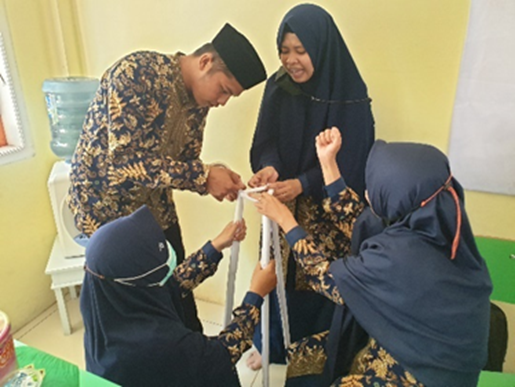Assistance in designing STEM-based learning at the Muhammadiyah 1 Paiton research-based elementary school
DOI:
https://doi.org/10.22219/jcse.v4i1.25197Keywords:
Lesson study, Research based school, STEM learning, STEM knowledge, Teacher competenceAbstract
STEM learning has now become the main approach applied in various schools in many countries. One of the obstacles faced by various schools in Indonesia in implementing STEM is the lack of understanding and experience of teachers about STEM-based learning. The purpose of this service program was to assist SD Muhammadiyah 1 Paiton Probolinggo in preparing and implementing STEM learning. The solution to the problems offered is socialization and assistance in designing STEM learning. The order of these community service activities was: 1) Matching Perceptions between the Community Service Team and Partner Schools; 2) Presentation of Series 1 Material: Innovative and STEM Learning Models; 3) Presentation of Series 2 Material: Lesson Study and Learning Community; and 4) STEM learning workshops. After carrying out community service activities at SD Muhammadiyah 1 Paiton, there has been a significant and large increase in teacher knowledge regarding STEM learning from before (M = 63.3, SD = 14.9) to after the service program (M = 95.6, SD = 6), t(11) = 6.6, p < .001, d = 1.91. Even though this service program has shown satisfactory results, this program needs to continue so that the learning community of teachers who able to optimize the design so that the implementation of STEM learning can be realized optimally.
Downloads
References
Baran, E., Canbazoglu Bilici, S., Mesutoglu, C., & Ocak, C. (2019). The impact of an out‐of‐school STEM education program on students’ attitudes toward STEM and STEM careers. School Science and Mathematics, 119(4), 223–235. https://doi.org/10.1111/ssm.12330
Barcelona, K. (2014). 21st Century curriculum change initiative: A focus on STEM education as an integrated approach to teaching and learning. American Journal of Educational Research, 2(10), 862–875. https://doi.org/10.12691/education-2-10-4
Busyairi, A., Rokhmat, J., Kosim, Gunawan, & Ardhuha, J. (2022). Pembelajaran STEM (Science, Technology, Engineering and Mathematics) berbasis potensi lokal bagi guru di SMPN 3 Batukliang. Jurnal Pengabdian Magister Pendidikan IPA, 5(4), 181–187. https://doi.org/10.29303/jpmpi.v5i4.2215
Diana, N., & Turmudi, T. (2021). Kesiapan guru dalam mengembangkan modul berbasis STEM untuk mendukung pembelajaran di Abad 21. Edumatica : Jurnal Pendidikan Matematika, 11(2), 1–8. https://doi.org/10.22437/edumatica.v11i02.11720
Ejiwale, J. (2013). (2013). Barriers to Successful Implementation of PDM. Journal of Education and Learning, 7(2), 63–74. 10.11591/edulearn.v7i2.220
Freeman, B., Marginson, S., & Tytler, R. (2019). An international view of STEM education. In STEM Education 2.0 (pp. 350–363). BRILL. https://doi.org/10.1163/9789004405400_019
Hacioğlu, Y., & Gülhan, F. (2021). The effects of stem education on the 7th grade students’ critical thinking skills and stem perceptions. Journal of Education in Science, Environment and Health. https://doi.org/10.21891/jeseh.771331
Hák, T., Janoušková, S., & Moldan, B. (2016). Sustainable development goals: A need for relevant indicators. Ecological Indicators, 60, 565–573. https://doi.org/10.1016/j.ecolind.2015.08.003
Hamimah, H., Zainil, M., Anita, Y., Helsa, Y., & Kenedi, A. K. (2022). Pelatihan pengembangan bahan ajar berbasis STEM sebagai solusi pembelajaran di masa pandemi COVID-19 bagi guru sekolah dasar. Dedication : Jurnal Pengabdian Masyarakat, 6(1), 33–42. https://doi.org/10.31537/dedication.v6i1.655
Hill, H. C., Lynch, K., Gonzalez, K. E., & Pollard, C. (2020). Professional development that improves STEM outcomes. Phi Delta Kappan, 101(5), 50–56. https://doi.org/10.1177/0031721720903829
Imaduddin, M., Nihayati, L., Nugroho, T. W., Murti, W. B., Sa’adah, L., & Kurniasari, D. (2021). Pendampingan pembuatan alat permainan edukatif topik ekologi berbasis STEAM pada kelompok guru PAUD Kecamatan Temayang Kabupaten Bojonegoro. Transformasi: Jurnal Pengabdian Masyarakat, 17(1), 27–37. https://doi.org/10.20414/transformasi.v17i1.2702
Izzati, N., Tambunan, L. R., Susanti, S., & Siregar, N. A. R. (2019). Pengenalan pendekatan STEM sebagai inovasi pembelajaran era Revolusi Industri 4.0. Jurnal Anugerah, 1(2), 83–89. https://doi.org/10.31629/anugerah.v1i2.1776
Kennedy, T. J., & Odell, M. R. L. (2014). Engaging students In STEM education. Science Education International, 25(3), 246–258. https://files.eric.ed.gov/fulltext/EJ1044508.pdf
Li, Y., Wang, K., Xiao, Y., & Froyd, J. E. (2020). Research and trends in STEM education: a systematic review of journal publications. International Journal of STEM Education, 7(1), 11. https://doi.org/10.1186/s40594-020-00207-6
Ling, L. S., Pang, V., & Lajium, D. (2019). The planning of integrated stem education based on standards and contextual issues of Sustainable Development Goals (SDG). Journal of Nusantara Studies (JONUS), 4(1), 300. https://doi.org/10.24200/jonus.vol4iss1pp300-315
Margot, K. C., & Kettler, T. (2019). Teachers’ perception of STEM integration and education: a systematic literature review. International Journal of STEM Education, 6(1), 2. https://doi.org/10.1186/s40594-018-0151-2
Martín‐Páez, T., Aguilera, D., Perales‐Palacios, F. J., & Vílchez‐González, J. M. (2019). What are we talking about when we talk about STEM education? A review of literature. Science Education, 103(4), 799–822. https://doi.org/10.1002/sce.21522
Ming Cheung, W., & Yee Wong, W. (2014). Does lesson study work? International Journal for Lesson and Learning Studies, 3(2), 137–149. https://doi.org/10.1108/IJLLS-05-2013-0024
Mitlin, D. (1992). Sustainable development: A guide to the literature. Environment and Urbanization, 4(1), 111–124. https://doi.org/10.1177/095624789200400112
Nadelson, L. S., & Seifert, A. L. (2017). Integrated STEM defined: Contexts, challenges, and the future. The Journal of Educational Research, 110(3), 221–223. https://doi.org/10.1080/00220671.2017.1289775
Nugraheni, F. A. S., Wati, I. K., Sari, M. W., Suciati, S., Widyastuti, A., & Kamaliah, K. (2022). Pelatihan pembuatan perangkat pembelajaran berbasis etno-STEM pada mata pelajaran IPA di sekolah menengah pertama. Jurnal Pengabdian Masyarakat Indonesia, 2(4), 357–365. https://doi.org/10.52436/1.jpmi.440
Owen, S. (2014). Teacher professional learning communities : going beyond contrived collegiality toward challenging debate and collegial learning and professional growth. Australian Journal of Adult Learning; v.54 n.2 p.54-77; July 2014, 54(2), 54–77. https://doi.org/10.3316/aeipt.203503
Popp, J. S., & Goldman, S. R. (2016). Knowledge building in teacher professional learning communities: Focus of meeting matters. Teaching and Teacher Education, 59, 347–359. https://doi.org/10.1016/j.tate.2016.06.007
Reeve, E. M. (2016). 21st century skills needed by students in technical and vocational education and training. Asian International Journal of Social Sciences, 16(4), 62–74. https://doi.org/10.29139/aijss.20160404
Richardo, R., Eliana, H. U., Anisah, N. K., Aisyah, N. A., & Halimatussa’diyah. (2021). Pendampingan guru-guru SD Krapyak Wetan dalam menerapkan pembelajaran tematik dengan pendekatan STEM. JPM (Jurnal Pemberdayaan Masyarakat), 6(1), 599–605. https://doi.org/10.21067/jpm.v6i1.4960
Robert, K. W., Parris, T. M., & Leiserowitz, A. A. (2005). What is sustainable development? Goals, indicators, values, and practice. Environment: Science and Policy for Sustainable Development, 47(3), 8–21. https://doi.org/10.1080/00139157.2005.10524444
Rosana, D., Kadarisman, N., Purwanto, A., & Sari, E. K. (2021). The effect of learning biophysics with stem approach on science process skills and critical thinking: Field study on application of na-aogs for increasing soybean productivity and growth rate. Jurnal Pendidikan IPA Indonesia, 10(3), 447–461. https://doi.org/10.15294/jpii.v10i3.30695
Şahin, H. (2021). The effect os STEM-based education program on problem solving skills of five year old children. Malaysian Online Journal of Educational Technology, 9(4), 68–87. https://doi.org/10.52380/mojet.2021.9.4.325
Setiawan, N. C. E., Sutrisno, S., Munzil, M., & Danar, D. (2020). Pengenalan STEM (Science, Technology, Engineering, and Mathematics) dan pengembangan rancangan pembelajarannya untuk merintis pembelajaran kimia dengan sistem SKS di Kota Madiun. Lumbung Inovasi: Jurnal Pengabdian Kepada Masyarakat, 5(2), 56–64. https://doi.org/10.36312/linov.v5i2.465
Shahali, E. H. M., Halim, L., Rasul, M. S., Osman, K., & Zulkifeli, M. A. (2016). STEM learning through engineering design: Impact on middle secondary students’ interest towards STEM. EURASIA Journal of Mathematics, Science and Technology Education, 13(5), 1189–1211. https://doi.org/10.12973/eurasia.2017.00667a
Sukmana, R. W., & Nurhayati, Y. (2019). Pengabdian kepada masyarakat pembelajaran berbasis STEM bagi guru - guru sekolah dasar di Kabupaten Bandung. Jurnal Pengabdian Tri Bhakti, 1(1), 1–4. https://doi.org/10.36555/tribhakti.v1i1.1345
Topsakal, İ., Yalçın, S. A., & Çakır, Z. (2022). The effect of problem-based stem education on the students’ critical thinking tendencies and their perceptions for problem solving skills. Science Education International, 33(2), 136–145. https://doi.org/10.33828/sei.v33.i2.1
Yildirim, B. (2016). An analyses and eta-synthesis of research on STEM education. Journal of Education and Practice, 7(34), 23–33. https://files.eric.ed.gov/fulltext/EJ1126734.pdf

Downloads
Published
How to Cite
Issue
Section
License
Copyright (c) 2023 Ahmad Fauzi, Fuad Jaya Miharja, Muthia Maharani Syaiful , Putri Nurul Nabilah , Nafisah Nur Azizah , Nifi Maulidyah , Salsabiilaa Roihanah

This work is licensed under a Creative Commons Attribution-ShareAlike 4.0 International License.













